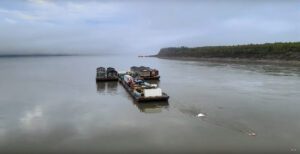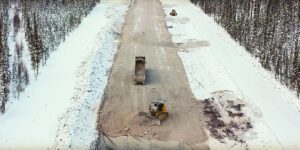A rise in air temperatures and drop in water levels means the Mackenzie Valley Highway is needed now more than ever, states the Sahtu Secretariat Incorporated.

Barge shipment schedules on the Mackenzie River are at the mercy of Mother Nature, as water levels drop. (Photo courtesy Sahtu Secretariat video, Our Case for the Mackenzie Valley Highway.)
Shorter seasons for winter roads and unreliable barge movements have jacked up the cost of living, with more cargo and supplies requiring expensive air transport.
“We already agree and understand that governments don’t build a highway for people to walk on. It’s for a specific purpose, whether it’s for economic reasons, whether it’s access to resources … people in communities may have mixed feelings. But in our case, when we look at the impacts how the seasons are changing, we as a community, want them to finish the highway.”
That was Fort Good Hope’s Edwin Rutse, who is president of the Yamoga Land Corporation.
In an excerpt from a new video called A Case for the Mackenzie Valley Highway, he acknowledges there are some concerns over having an all-season road through the Sahtu.
But, he says the positives outweigh them.

Yamoga Land Corporation president Edwin Rutse is from Fort Good Hope. (Photo courtesy Sahtu Secretariat video, Our Case for the Mackenzie Valley Highway.)
In that same video, Rutse and former Fort Good Hope Chief Tommy Kakfwi say there are also national defence considerations.
“As we all know, there’s a war going on right now in Ukraine, and we hear all the news. And that starts to make me think about we’re accessible from the North. How is the country going to defend us? So, the only thing that I see that’s missing, that’s to get up here is the highway. You want to protect the north, you need a highway.”
“We will feel secure. And I think the military will feel more secure in maintaining a stronghold on the northern part of Canada, because we are remote. The Sahtu is very remote.
“(The last major road project) done was Alaska Highway, using their military. I think if we can do that, it would certainly strengthen their sovereignty over our land and making sure that it’s being patrolled. Because we’re vulnerable up here.”
Norman Wells Mackenzie Valley Highway Liaison Officer Todd McCauley doesn’t mince words.
“We strongly believe that the threat from China and Russia is real towards Canada. Basically, we’re sitting ducks.”

The Mackenzie River with lower than normal water levels. (Photo courtesy Sahtu Secretariat video, Our Case for the Mackenzie Valley Highway.)
Through a series of interviews with Sahtu residents, businesspeople and political leaders, the video describes the difficulties of living in a climate-changing high-cost region of the NWT.
It makes the case that the answer to both rests in large part on the building of the decades-discussed all-season road.
So, what’s the solution for reliable freight access in the Sahtu for annual re-supply of fuel and all the other items needed for life in the North?
Secretariat chairperson Charles McNeely says, “The solution would be if we had an all-season road. A gravel road that we can drive from here and drive south.”
Liaison Officer Todd McCauley echoes that thought:
“We call it a highway, but it’s not the 401 or QEW. It’s single lane in both directions and it’s gravel. The term ‘highway’ is a bit of a misnomer when you talk to people in the south. Basically, what we’re really trying to build is an all-weather road.”

All-season road construction in the NWT. (Photo courtesy Sahtu Secretariat video, Our Case for the Mackenzie Valley Highway.)
Sahtu Secretariat Incorporated has long supported the extension of the Mackenzie Valley Highway from Wrigley to lnuvik in the Northwest Territories.
The decision to launch a new public relations strategy is timely.
With the professionally produced video, the Sahtu Secretariat also released a report called Securing Canada’s Link to the Arctic: The National Defense and Security Benefits of the Mackenzie Valley Project.
This report lays out arguments for the highway in the context of national defense and sovereignty and shows how the highway will help Canada to establish its full control over its North.
The Secretariat’s report reflects the aspirations of Canada’s just released national defense strategy titled, “Our North, Strong and Free: A Renewed Vision for Canada’s Defence.
And the final PR component, for the Sahtu Secretariat is the creation of an easy-to-use software application to be a readily available source of information on all things Sahtu.
Leaders in the Sahtu agree the region has a lot of potential and there aren’t strong anti-business or anti-development sentiments.
As Secretariat chairperson Charles McNeely says: “So our doors are open, if you want to do business, come on up.”

All-season road construction in the NWT. (Photo courtesy Sahtu Secretariat video, Our Case for the Mackenzie Valley Highway.)





